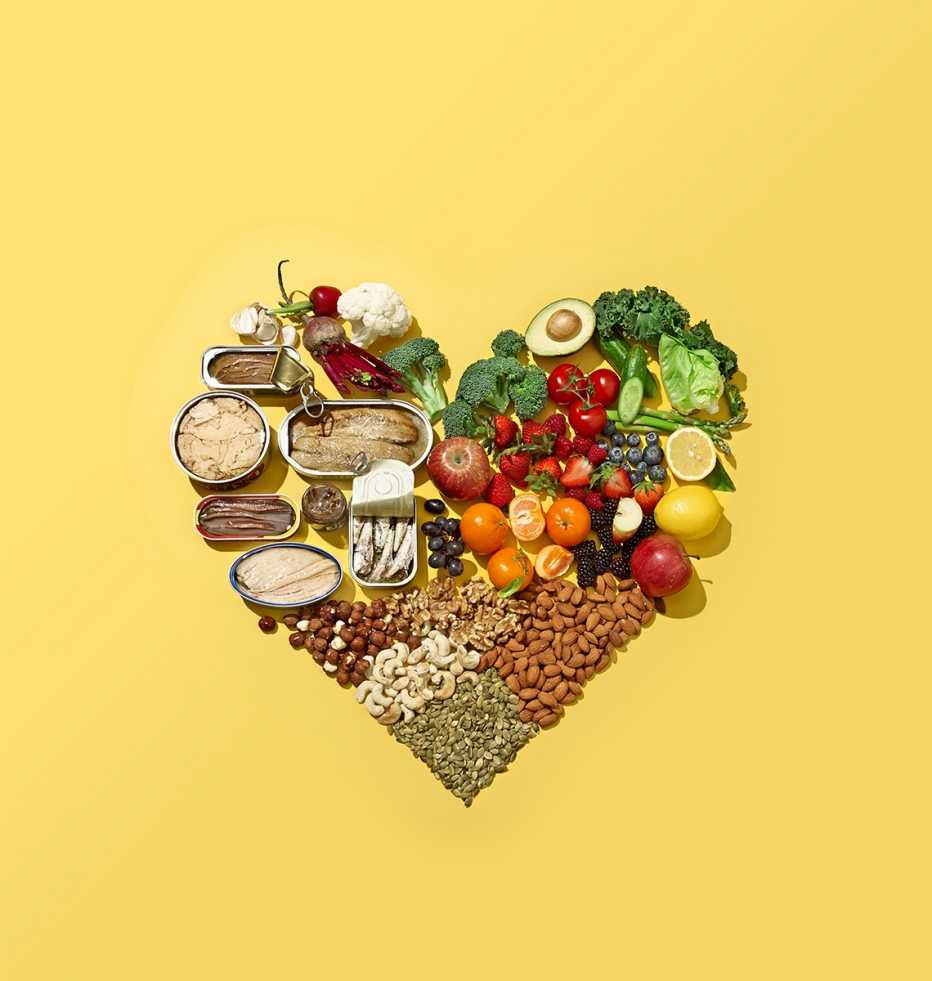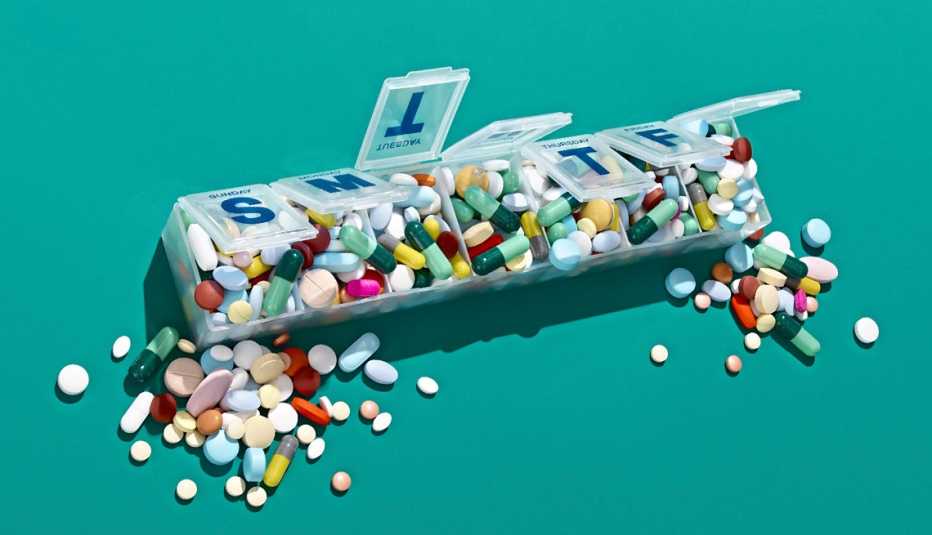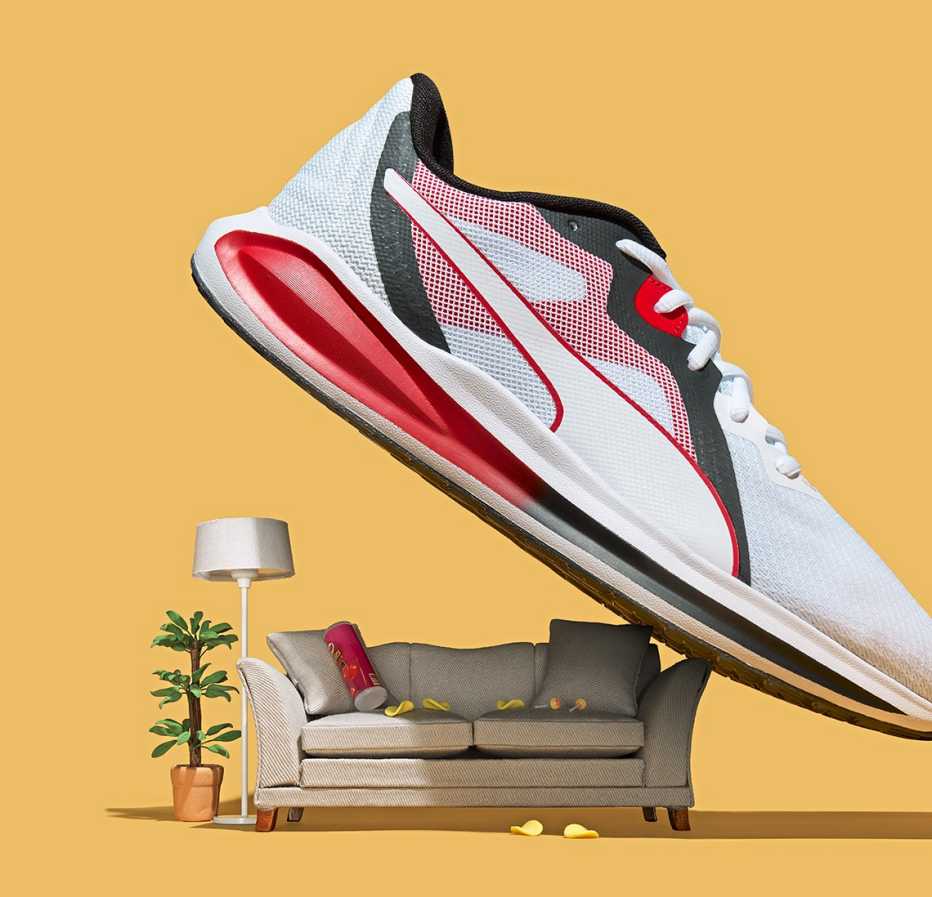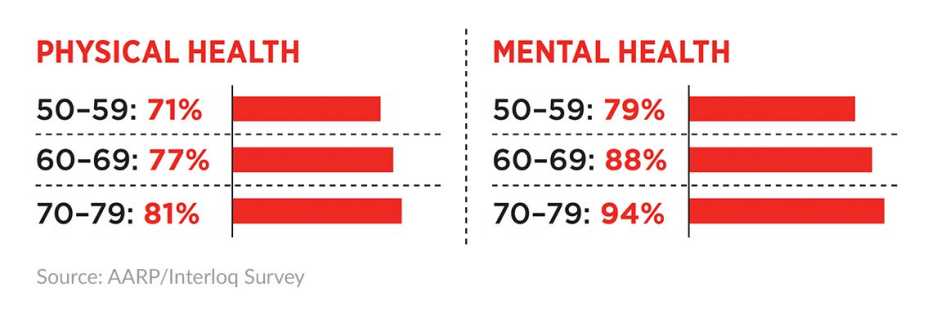18. What’s a worthwhile fitness goal for people in their 50s?
If you dream of running a marathon, that’s great. But there’s a simpler goal within such big goals as well, Metzl says: “Just start exercising, and don’t stop. Build a foundation, and keep building with the next 30 years in mind. Then you can set more specific goals.”
19. I’ve been exercising but haven’t lost any weight. It feels pointless.
Weight loss comes primarily from eating healthier food and fewer junk calories. What exercise does is dramatically lower your risk of age-related health issues, from bone loss to heart disease to back pain, Metzl explains.
20. My joints ache after exercise. Is arthritis setting in?
Exercise soreness goes away after a day or two. With osteoarthritis, you’ll most likely be dealing with joint pain, swelling and limitations on motion, Metzl says. “Because we’re talking pain, people often think, I have arthritis — I need to baby it. The opposite is true.” Building up muscles around your joints will improve any arthritis symptoms you currently have and prevent more of them in the future.
21. Are fitness watches worth the expense?
Top Lifestyle Concerns Among People 50 to 59
- Back pain: 33%
- Weight gain: 33%
- Lack of energy: 32%
- Memory loss: 30%
- Arthritis: 30%
Source: AARP/Interloq Survey
A military study involving 1,500-plus soldiers is underway to test a theory that smartwatches can help soldiers manage stress and train more effectively. While definitive results aren’t in, if something can motivate and protect you, it might be worth a look.
22. I’ve had back pain for years. Do I have to learn to live with it?
No, just the opposite: You need to learn to live without it. Recent trials have shown that when some people suffer chronic pain for a long time, their brains can still generate pain signals, even though the problem has healed. A new treatment — pain reprocessing therapy — teaches the brain to stop sending those signals. In a 2021 clinical trial, two-thirds of those who used the therapy for four weeks were pain-free or nearly so, and brain scans showed reduced activity in pain processing.
23. What else can I do for my bad back?
Plank exercises, Metzl advises. Lie facedown on a mat. Bend your elbows, and bring your hands together under your chin. Now lift your knees, hips and torso off the floor, so your weight is on your elbows and toes. Keep your back straight, and don’t let your belly or hips sag. Hold this position for as long as you can. Repeat twice.
Aging: Keeping Up Appearances
24. What’s a ‘healthy’ sex drive for someone in their 50s?
If your current sex drive makes you happy, it’s healthy, notes gynecologic oncologist Elizabeth Poynor, M.D. If it’s low and that’s upsetting to you, it’s time to look for the root cause of your sluggish libido and address it. “Not everybody has to have lots of sex to be healthy and happy,” Poynor adds. “It’s highly individualized.”
25. I’m just not enjoying growing older. What’s wrong with me?
“How old do you feel?” asks Diehl. Research shows that feeling younger is associated with better mental and physical health, cognitive function and satisfaction with life. A study that followed nearly 3,600 people for 10 years found that those who started out with a higher subjective age and depression ended up with more physical health issues later on. If you’re depressed and “feel” older most days, seek help.
26. What can I do about the stress in my life?
Aggressively rethink how you react to daily dramas. A 2020 study showed that people experiencing “unbearable” stress lost nearly three years from their life expectancy. Always remember that stress isn’t a demanding boss, a struggling child or lousy daily news headlines; it’s your reaction to them. You have two choices: Remove the stressor, or learn how to react to it in a healthier way.
27. I try to ‘stay young’ in how I live and think. Am I being ridiculous?
Nope, you’re just taking advantage of the way we’re redefining aging. People in their 50s to 70s today “were the first cohorts that grew up with better education, better health care, and developed different lifestyles,” Diehl says. That has translated into older people looking and behaving much younger than people their age in previous generations. Embrace it!
Survey respondents aren’t clamoring for Botox and hair weaves. Only 18 percent said they were very or extremely concerned about thinning hair. The next highest appearance concerns were hair loss (17 percent) and wrinkles (15 percent), though those worries were higher among women.
Source: AARP/Interloq Survey
28. I’m thinking about doing some surgical ‘freshening up,’ but is cosmetic surgery safe?
The fact is, we’re surrounded by people who’ve had cosmetic surgery: There were 2.3 million procedures in 2020, and surveys show that about 90 percent of patients are satisfied with their results. And, in general, cosmetic surgery is safe. A study of more than 26,000 cosmetic procedures foud that only about 1 percent of patients experienced complications in the 48 hours that followed surgery.
29. My husband refuses to talk about his health or go to the doctor. Is he hiding something?
Half of men admit that they don’t talk about their health, a Cleveland Clinic survey showed. “Not knowing there’s a problem may be preferable to the discomfort of learning there is one,” says Harvard clinical health psychologist Natalie Christine Dattilo. Forget guilt-tripping and nagging; you’ll only cause resentment. Try to give off calm, supportive and loving vibes. Be a good role model and take care of yourself in the meantime.
30. How do I shake this chronic exhaustion I’ve picked up during the pandemic?
Eat nourishing foods. Drink lots of water. Change out of your pajamas. (Yes, every day.) And exercise — moving your body on a daily basis builds the physical and emotional resilience you need to make it through yet another variant. These are all what we might call “the self-care basics,” notes Barbara Hannah Grufferman, author of AARP’s Love Your Age.
The Older We Get, The Better We Feel
Eighty-four percent of those ages 70 to 79 said their overall health is good, very good or excellent; while just 74 percent of those ages 50 to 59 said this.
31. I had COVID last winter, and I still feel off. Is this long COVID?
Data suggests that more than half of COVID survivors wind up with post-acute COVID-19 syndrome. It’s marked by extended breathing problems, brain fog, headaches and joint pain. Studies show that the virus may persist in the heart, brain and spinal fluid for months after the initial infection has run its course. If you have persistent post-COVID health problems, see your doctor.
32. I don’t feel as sharp at work as I used to. What can I do?
Consider different ways to reinvigorate your career. That might mean moving to a new division, pursuing a promotion or pivoting to another field entirely. Updating your skill set can also organically boost energy levels at work. Become active on social media channels that are relevant to your career, take a class, or freshen up your LinkedIn profile or create one if you haven’t yet done so.
33. How do I prevent myself from becoming a caregiving nightmare to my kids?
Start a conversation now. “Tell them, ‘My passwords are located here; here’s my financial situation; these are the medicines I’m on,’ ” explains certified care manager Amy Cameron O’Rourke, author of The Fragile Years. Make these issues part of an annual family meeting, because what you want at age 55 in terms of, say, end-of-life wishes may be different once you’re 75.
34. A loved one and I are estranged because our values just don’t align. How do I reconnect?
Some 27 percent of American adults are estranged from a family member, according to a survey by Cornell University sociologist Karl Pillemer. Whether your rift was caused by politics, unresolved childhood baggage or something else, move toward healing by reaching out and saying, “My relationship with you is more important than the topic we are disagreeing on,” O’Rourke suggests. Mending your family feud will do more than resuscitate your relationship; it may make you healthier.
Health: Resisting Disease
35. I have hypertension. Are blood pressure cuffs worth the money?
Yes. A 2021 study, over 10 years, of 11,502 people ages 45 to 60 showed that those with the lowest cumulative systolic BP readings lived 4.1 years longer and delayed heart disease by 5.4 years. Measuring your blood pressure frequently reminds you to do the things needed to keep it in a healthy range.
36. What’s the first sign of heart disease?
It’s plural: unusual fatigue, sleep problems, shortness of breath, indigestion and chest pain, says Suzanne Steinbaum, an osteopathic preventive cardiologist. Take special note if the latter three happen when you’re active and go away when you’re at rest.
37. I love my nightly glass of wine. A little bit of vino is good for my heart, right?
Maybe not. Several organizations, such as the Mayo Clinic, still endorse that idea. But the American Heart Association doesn’t recommend drinking any form of alcohol to gain health benefits. Research is beginning to coalesce around the idea that light or moderate drinking may not help to prevent heart disease — so much so that the World Heart Federation declared in 2022 that “no level of alcohol is safe” for your heart health.
38. How about marijuana? Is it safe?
Not as safe as it used to be. A meta-analysis of studies found that pot potency — its THC level, specifically — rose 24 percent from 1975 to 2017. A JAMA review of studies of more than 1,400 people 50 and older found that higher doses of THC were associated with a higher incidence of thinking and perception issues (not the good kind), as well as dizziness.
39. I have the occasional cigarette. Does that really matter?
Yes. A review of 141 studies showed that people who smoke just one cigarette a day still have half the heart disease risk of people who smoke 20.
40. Does ‘prediabetes’ mean you’re definitely going to get diabetes?
Most-Feared Diseases Among People 50 to 59
- Stroke: 29%
- Heart Disease: 29%
- Cancer: 27%
- Alzheimer's: 27%
- Diabetes: 25%
Source: AARP/Interloq Survey
There are no guarantees, but there’s a lot of evidence that making lifestyle changes now can dramatically reverse the direction your health is headed in. For example, preliminary results of a 2022 study of more than 8,700 people showed a strong relationship between cardiorespiratory fitness and new-onset type 2 diabetes: The higher the fitness level, the lower the type 2 incidence.
41. What’s a simple, tech-free way to measure my health?
Waist-to-height ratio. Strive for a waist circumference that’s less than half your height.
42. How much should I worry about cancer in my 50s?
The median age for a cancer diagnosis is 66, meaning half of all cases occur in those who are younger. These are especially important years to pay attention to cervical cancer (median age at diagnosis: 50) and breast cancer (median age at diagnosis: 63). The good news is that cancer mortality rates have fallen about 32 percent since 1992, with an overall five-year survival rate of 68 percent.
43. So, if cancer runs in my family, I should get screened regularly?
The U.S. Preventive Services Task Force recommends screening for several types of cancer, including breast, cervical, colorectal and lung. There is evidence showing that screening tests can catch these cancers early and make a difference in treatment and survival.
44. What about prostate cancer? Should I get a PSA test?
Yes. Prostate cancer is the most common cancer in men besides skin cancer, and 40 percent of cases hit men before age 65. Nearly 99 percent of prostate cases, however, are treatable if they are caught early. And don’t panic if your PSA is elevated. Most men who have an elevated PSA don’t have cancer, and only 25 percent of prostate biopsies find cancer, according to the National Institutes of Health.
45. My mother was legally blind when she died. How do I protect my eyes?
Pop in to see the eye doctor for a dilated-eye exam every year, says Kenneth Dickerson, a doctor of optometry at the University of Rochester’s Flaum Eye Institute. Most eye diseases, such as macular degeneration, are silent sight stealers; without a doctor’s inspection, you don’t know you have a condition until it’s at an advanced stage.
46. Speaking of senses, what can I do about my damn tinnitus?
There are no sanctioned treatments. Still, ask your doctor about neuromodulation, in which a device simultaneously delivers electric stimulation to the tongue and auditory signals to both ears. A 2020 study found that this type of therapy reduced tinnitus symptoms over a 12-week period.
Brain Power: Remaining Sharp
47. What’s the number one thing I can do to help prevent dementia?
Be in bed by 10 p.m. “The earlier you get to sleep, the more slow-wave sleep you’ll get,” says Sara Mednick, a professor of cognitive science at the University of California, Irvine, and author of The Power of the Downstate. Slow-wave sleep (SWS) supercharges brain health, clearing away toxins and other buildup that cause dementia, as well as developing connections between areas of the brain to create stronger memories.
But SWS also abides by nature’s circadian clock and peters out at around 1 a.m., so you need to hit the sack early to maximize your time there. In short, you can’t close your eyes at midnight and still expect to net three hours of memory-protective SWS.
A majority of respondents ages 50 to 79 said they’re afraid of losing their mental or physical faculties, becoming a burden to their families and having to give up their independence. As one participant wrote of Alzheimer’s disease, “It terrifies me to think of losing myself.”
Source: AARP/Interloq Survey
48. Yikes! I’ll try to go to bed earlier, but I notice I sleep less now that I’m in my 50s. Is that normal?
Yes, it’s totally normal. In your 20s you needed about eight to nine hours of sleep every night. More mature you needs about an hour less, notes Nalaka Gooneratne, M.D., a sleep medicine physician and geriatrician at the University of Pennsylvania’s Perelman School of Medicine. You know you’re clocking enough if you’re alert during the day; sleepiness or brain fog signals a possible medical issue, such as sleep apnea, that you’ll want to get checked out.
49. About that nightly wine: It’s still good for my brain, right?
No. No, it’s not. A study of more than 25,000 people in the U.K. showed that any alcohol consumption at all had negative effects on brain volume and structure — and that those who binge drink or who are overweight with high blood pressure are more susceptible. The study’s key takeaway: “No safe dose of alcohol for the brain was found.”
50. What else can I do to protect my brain?
There’s no miracle pill for brain health, though one of the most important things you can do is keep your weight stable. A 2021 meta-analysis of data found that being significantly overweight increased the risk of dementia. Surprisingly, however, being underweight was also a risk factor. (Turns out you can be too thin, if not too rich.) Plus, getting exercise is important to cutting your risk.
The full, exclusive AARP/Interloq survey of people age 50 to 79 is available here.
Mike Zimmerman is a frequent contributor to AARP The Magazine and AARP Bulletin and the author of more than a dozen books on health, nutrition and fitness, including The 14-Day Anti-Inflammatory Diet.










































































More on health
Quiz: Getting Fit After 50
Are you up to speed on the benefits of working out?
What Should Your Diet Be Like After 50?
As our bodies change, so do our nutritional needsHealth Problems That Strike After 50
Know the chronic conditions that creep up in midlife